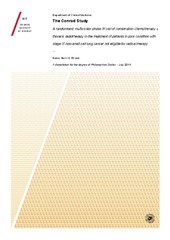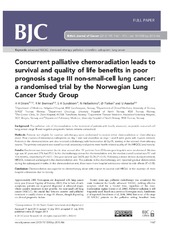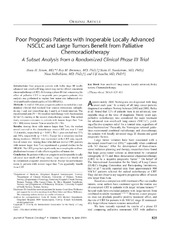| dc.contributor.advisor | Aasebø, Ulf | |
| dc.contributor.author | Strøm, Hans Henrik | |
| dc.date.accessioned | 2015-01-21T12:47:08Z | |
| dc.date.available | 2015-01-21T12:47:08Z | |
| dc.date.issued | 2014-12-10 | |
| dc.description.abstract | The thesis constitutes the collected report on an RCT the candidate has conducted on behalf of the Norwegian Lung Cancer Study Group. In addition to three scientific articles published in international peer-reviewed journal, it consists of texts on the background, the choice of methods and material, as well as results and discussion of the treatment regimens that have been studied in the trial.
The aim was to compare a palliative chemoradiation regimen to palliative chemotherapy alone, with respect to survival, health-related quality of life (HRQOL) and toxicity in incurable stage III NSCLC patients with negative prognostic factors. Derived from the treatment – concurrent radiation – the trial was named The Conrad Study.
Between November 2006 and November 2011patients not eligible for curative radiotherapy were randomized to receive either chemoradiation or chemotherapy alone.
Four courses of intravenous carboplatin day 1 and oral vinorelbin day 1 and 8 were given with 3-week intervals. Patients in the chemoradiation arm also received radiotherapy with fractionation 42 Gy/15, starting at the 2nd chemotherapy course. Primary endpoint was overall survival; secondary were health related quality of life (HRQOL) and toxicity.
Enrolment was terminated due to slow accrual after 191 patients from 25 Norwegian hospitals were randomized. Median age was 67 years and 21% had Performance Status 2. In the chemotherapy versus the chemoradiation arm, the median overall survival was 9.7 and 12.6 months, respectively (p<0.01). 1-year survival was 34.0 % and 53.2 % (p<0.01). Following a minor decline during treatment, HRQOL remained unchanged in the chemoradiation arm. The patients in the chemotherapy arm reported gradual deterioration during the subsequent months. In the chemoradiation arm, there were more hospital admissions related to side effects (p < 0.05) and PS 2 did not have survival benefits.
Conclusions: Chemoradiation was superior to chemotherapy alone with respect to survival and HRQoL at the expense of more hospital admissions due to toxicity. | en |
| dc.description.doctoraltype | ph.d. | en |
| dc.description.popularabstract | Conrad studien er en randomisert klinisk studie, der 188 pasienter med negative prognostiske faktorer og lokalavansert ikke-småcellet lungekreft stadium III enten har fått lindrende cellegift alene eller en kombinasjon av lindrende stråling og cellegift.
Siden pasientene ikke kunne helbredes var både levetid, livskvalitet og bivirkninger behandlingsmål. Tradisjonell behandling har vært cellegift alene. Stort vekttap ved diagnosetidspunktet, stor størrelse på svulsten og/eller svekket allmenntilstand (Performance status ≥ 2) ble regnet som negative prognostiske faktorer. I tillegg måtte svulstene kunne inkluderes i et adekvat strålefelt.
Lindrende kombinasjonsbehandling ga signifikant forlenget levetid til pasienter som ikke hadde Performance status ≥ 2. Pasientene fikk også bedre bevart livskvalitet så lenge de levde. Kombinasjonen av cellegift og strålebehandling medførte forbigående mer svelgsmerter og mer forbigående sykehusinnleggelser pga behandlingsbivirkninger i behandlingsperioden. Etter ett år levde halvparten av pasienten som fikk kombinasjonsbehandling, men bare en tredjedel av pasientene som fikk cellegift alene. | en |
| dc.description.sponsorship | This research was supported by unrestricted grants from the North Norway Regional Health Authority and Pierre Fabre. | en |
| dc.description | Paper III of this thesis is not available in Munin:<br> 3. Strøm HH, Bremnes RM, Sundstrøm SH, Helbekkmo N and Aasebø U: ‘How do elderly poor prognosis patients tolerate palliative concurrent chemoradiotherapy for locally
advanced NSCLC stage III? A subset analysis from a clinical phase III trial’. (Strøm HH, Bremnes RM, Sundstrøm SH, Helbekkmo N and Aasebø U: ‘How do elderly poor prognosis patients tolerate palliative concurrent chemoradiotherapy for locally
advanced NSCLC stage III? A subset analysis from a clinical phase III trial’. (Submitted paper). | en |
| dc.identifier.uri | https://hdl.handle.net/10037/7037 | |
| dc.identifier.urn | URN:NBN:no-uit_munin_6621 | |
| dc.language.iso | eng | en |
| dc.publisher | UiT The Arctic University of Norway | en |
| dc.publisher | UiT Norges arktiske universitet | en |
| dc.rights.accessRights | openAccess | |
| dc.rights.holder | Copyright 2014 The Author(s) | |
| dc.rights.uri | https://creativecommons.org/licenses/by-nc-sa/3.0 | en_US |
| dc.rights | Attribution-NonCommercial-ShareAlike 3.0 Unported (CC BY-NC-SA 3.0) | en_US |
| dc.subject | VDP::Medisinske Fag: 700::Klinisk medisinske fag: 750::Onkologi: 762 | en |
| dc.subject | VDP::Medical disciplines: 700::Clinical medical disciplines: 750::Oncology: 762 | en |
| dc.subject | VDP::Medisinske Fag: 700::Klinisk medisinske fag: 750::Lungesykdommer: 777 | en |
| dc.subject | VDP::Medical disciplines: 700::Clinical medical disciplines: 750::Lung diseases: 777 | en |
| dc.title | The Conrad Study -
A randomised, multicenter phase III trial of combination chemotherapy ±
thoracic radiotherapy in the treatment of patients in poor condition with
stage III non-small cell lung cancer not eligible for radical therapy | en |
| dc.type | Doctoral thesis | en |
| dc.type | Doktorgradsavhandling | en |


 English
English norsk
norsk


